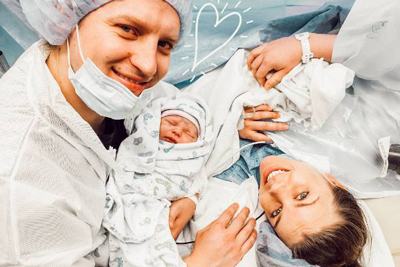
Giving birth to my first child during the height of the pandemic, the end of April 2020, was a roller coaster of emotions for me.
I study the prevention of perinatal (pregnancy and postpartum) mental health disorders as a researcher here at Utah State in the Human Development & Family Studies Department. So, you would think I would be prepared for the many physical and mental changes that coincide with the various stages of pregnancy and postpartum.
Personally, I have dealt with anxiety and minor bouts of depression before, but nothing like what was brought with my first pregnancy and birth during the COVID-19 pandemic.
The pandemic, obviously, brought its own problems, including but not limited to: social isolation, anxiety and fear over illness, grief over the loss of loved ones, and depression as we felt stuck and helpless with the state of the world.
This is particularly problematic for women during the perinatal period. Women during child birthing years are already at the greatest risk for mental health issues like anxiety and depression. Add a scary pandemic to the mix and the effects of this on families and you have a lot of new parents in need of support.
Being unable, or too uncomfortable, to ask for help from loved ones after the birth of my son meant I felt completely isolated. After my partner, Adam, went back to work as an Operating Room nurse at the Intermountain Medical Center in Murray, UT, I was also fearful of him contracting the virus. At the beginning, we had a lot less information about how this virus could or could not spread to vulnerable populations of infants or children. And although we now know that they are less likely to contract/present serious symptoms of the virus, I still couldn’t imagine getting sick, let alone hospitalized, and therefore unable to care for my newborn infant that needed me more than anything else. My anxiety spiraled as I searched for meaning and validation of the novel things I was going through.
As the stages of the pandemic and postpartum wore on, I turned to social media for an online support system that was not as readily available in-person. I noticed an account on Instagram, @motherhoodunderstood, collecting stories from women who gave birth during this pandemic and how it impacted their own mental health.
I reached out to the account owner and asked if I could collect and analyze the stories qualitatively to understand the mental health experiences of women who have given birth during the pandemic. This sailed easily through the Institutional Review Board and I now hold 20 meaningful and impactful stories of postpartum women and their struggle with mental health during the rise of Covid-19.
Stay tuned in the next few months as I analyze the data and share the results!
If they’re anything like my own story, I know that mothers’ mental health has been deeply impacted by this era of the coronavirus.

